Newspapers 2.0: How Web 2.0 is The Telegraph?
I've been looking at the extent to which different newspapers in the UK have adopted so-called "Web 2.0" technologies in their web sites. So far I've covered The Mirror, The Times and The Express. Today I want to look at the online version of The Telegraph.
The Telegraph has been quite bullish in recent months over their internet performance, boasting of being "Britain's No.1 quality newspaper website". Unlike the laughable claim of The Daily Express to be the world's best newspaper, this is no mere advertising strapline from The Telegraph - they incorporate into their online masthead a badge from Hitwise to back up their claim.

This is an assertion that has been disputed by The Guardian, in a spat over usage figures that has been rumbling for some months now. However it is clear from even a cursory glance around their site that The Telegraph has invested heavily to compete online.
RSS feeds
On the RSS front, The Telegraph has a feed available from the front page, and it is auto-discoverable in a browser. Their RSS feeds are also prominently linked to in the services panel that forms part of the site's left-hand navigation on the homepage, although the page does not include any kind of standard orange RSS logo.

The Telegraph offers 24 different news and feature RSS feeds.
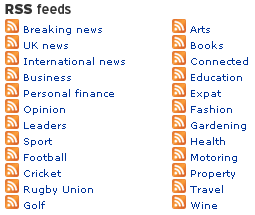
Their RSS help page also has a button to add the feeds to Netvibes. Like The Daily Express, The Telegraph also states that you must consent to their Terms and Conditions before using their RSS feeds.
To view our feeds, click on the orange XML logos. You will need to check the box below, agreeing to the Terms and Conditions of Use, first.
However, although the page provides a link through to The Telegraph's terms and Conditions, there is no check-box on the page. And, even more confusingly, it is the feed title, not the orange icon as stated, which acts as the link. Beyond the warning, in contrast to the Daily Express, there doesn't appear to be any attempt to actually enforce consent to the Terms and Conditions of Use
The RSS feeds, when displayed in a browser, have a stylesheet attached to them, which includes contextual help on how to use the feed in a News Reader.
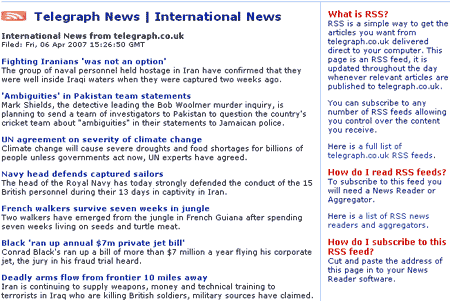
Social bookmarking
Regular story pages on The Telegraph include five social bookmarking and social news links at the foot of the page, linking to del.icio.us, Digg, Newsvine, NowPublic and Reddit.
One issue I spotted with this was that The Telegraph has the slightly odd habit of tagging a vaguely related but different story onto the bottom of a larger story. This might work when laying out the columns of a print newspaper, but on the web, where the unique URL is king, this doesn't make sense. Particularly if you are including social bookmarking calls-to-action which revolve around a stories URL.
In the example below, when you use the Digg link, are you Digging the story about the Inter - Valencia brawl, or the speculation about Rijkaard's future that follows it?
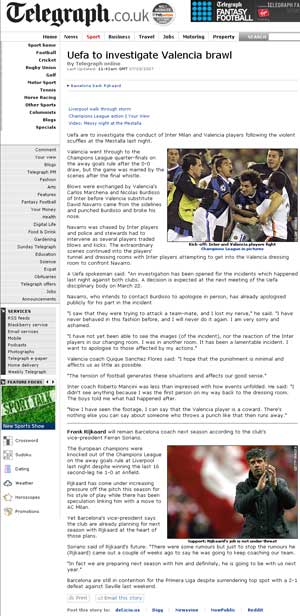
Telegraph Blogs
The Telegraph's blogs have come under fire from The Independent, who can't exactly claim to have had much success in the area themselves, and The Telegraph have defended their online investment and strategy strongly. They also offer some of the most "blog-like" of those offered by the major UK newspapers.
The blogs sit on their own blogs.telegraph.co.uk sub-domain, and feature a different top bar of navigation to the rest of the site, offering a categorised way to navigate through the blogs on offer.
An RSS feed is available aggregating all of the blog content from a particular section, like sport for example.
RSS feeds are also available for the blogging output of each individual author.
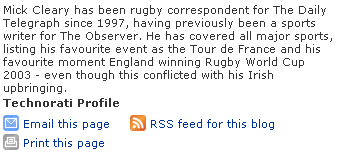
Telegraph blogs incorporate a comment facility, and also include the same links to social bookmarking and social news as regular stories. Again they invite their readers to submit the content to del.icio.us, Digg, Newsvine, NowPublic and Reddit.

Blog entries are also tagged, and the tags feature at the top of the excerpts from each entry when they appear on the blog index page.

Secondary navigation through the blogs include monthly archive links and a tag cloud at an individual author level.
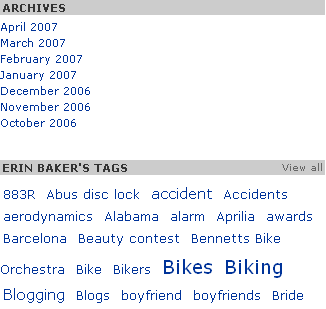
Web 2.0 verdict
The Telegraph is generally perceived as a stuffy old paper for conservatives with a small 'c', and has steadfastly refused to follow the Times, Independent or Guardian down the smaller format route in print. And let us be honest here, their very name derives from cutting edge communications technology rooted in the 19th century, not the 21st.
On the web, however, the paper has displayed a willingness to play with the format. Telegraph blogs cover a wide-range of topics, and seem well implemented. Links to social bookmarking are including, and whilst 24 RSS feeds of news and editorial isn't in any way over-whelming, they are prominently promoted and automatically linked. The investment in the Telegraph's site looks to have been a good one.
Next...
Next week I shall be continuing this series of posts, and looking at the Web 2.0 features on the sites belonging to The Daily Mail, The Independent, The Guardian and The Sun.
Martin,
There's something much more exciting in the offing. You've missed some of the hints being dropped by the Telegraph, and the announcement made just this week by their top tech blogger Shane Richmond. His post - http://blogs.telegraph.co.uk/technology/shanerichmond/apr07/mytele.htm
will give you some idea of the scope of new developments - including a fully-fledged blog-centric social networking service. The first bits are being built out now from the current blogs site. There's some pretty exciting stuff in the pipeline with the reader's community blogging platform due to soft launch this week. My colleague James Higgs also writes about this from the inside at http://staff.interesource.com/james/apr2007/my-telegraph-status-thursday.htm
We are also responsible for the The Mirror's blogs, and they likewise have some really exciting and quite different plans. Personally, I think newspapers in the UK are way ahead of magazine publishing, the book industry, the music industry, the marketing comms, broadcast media and financial services industries in terms of Web 2.0 innovation. It would be interesting to debate why.
Thanks for the comment Tim, the My Telegraph initiative does look interesting. It was my bad luck that they announced it just as I was publishing this set of reviews, which have been in the pipeline for a few weeks now. Just the risk of looking at a fast-moving industry I guess :-)